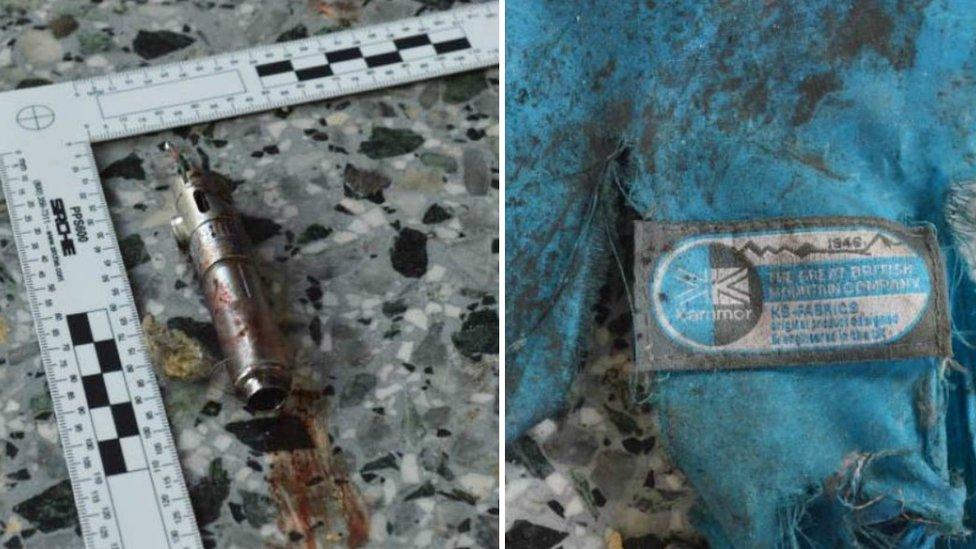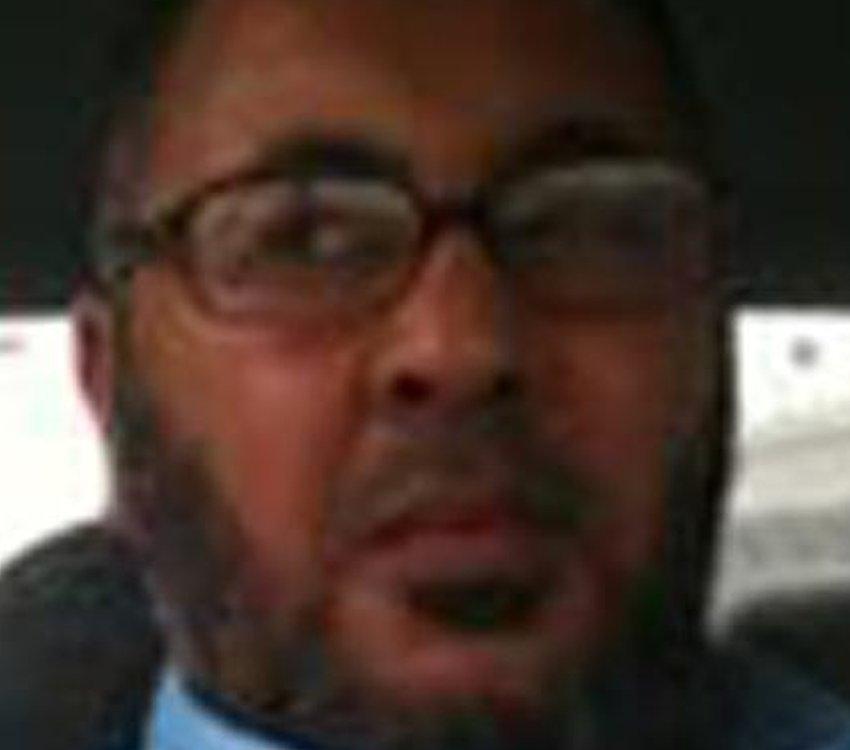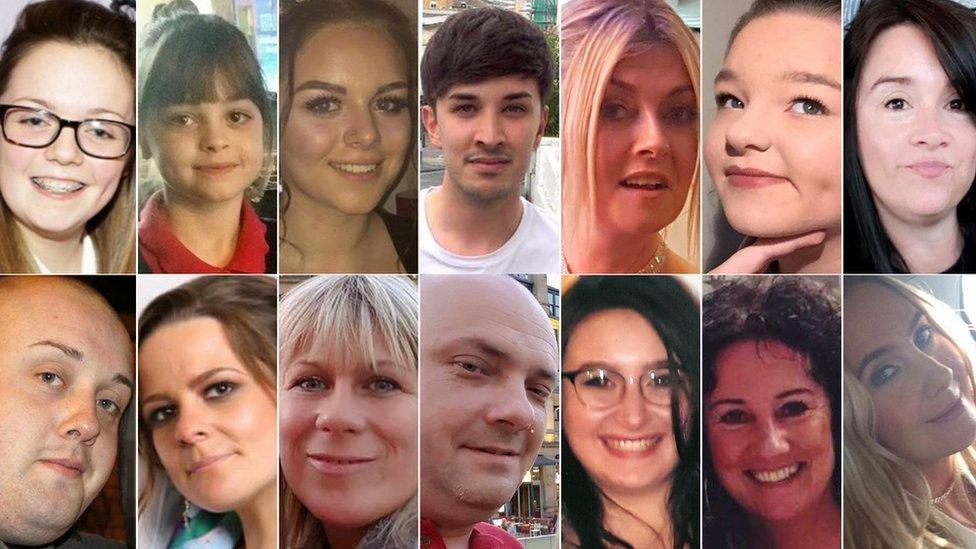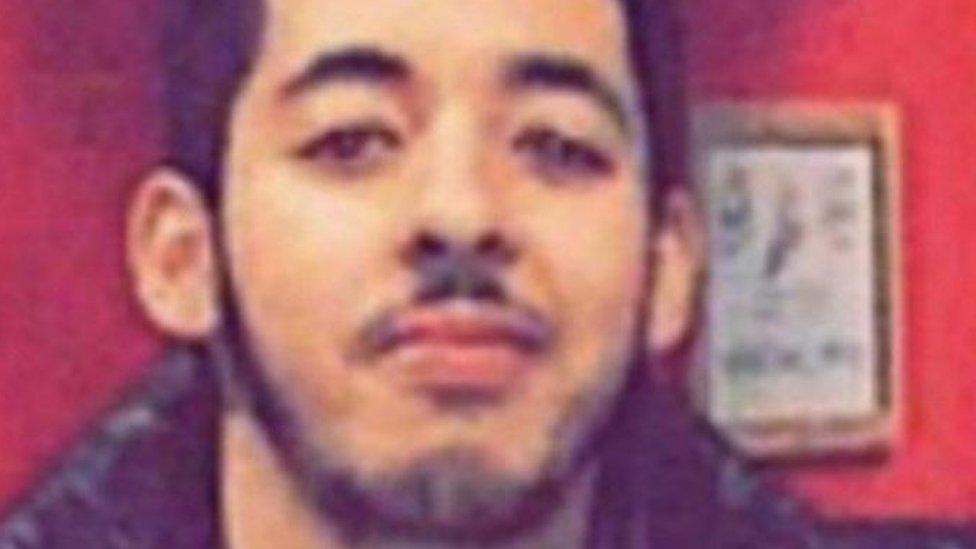Manchester attack: 'Fury' at US 'evidence' photos leak
- Published

The New York Times says this evidence was gathered at the scene of the attack
The UK government and police have reacted with anger after a US newspaper published photos apparently showing the scene of the Manchester bomb attack.
Counter terror police chiefs said the leak undermined their investigation and victims' and witnesses' confidence.
A Whitehall source added: "We are furious. This is completely unacceptable."
Greater Manchester Mayor Andy Burnham said he had raised the leaks with the US ambassador.
Earlier UK Home Secretary Amber Rudd said she was irritated with the US for releasing information about bomber Salman Abedi.
Ms Rudd said she had told Washington "it should not happen again".
But the New York Times then published, external photos it says were gathered by UK authorities at the scene of the attack, including the remnants of a backpack, nuts and screws, and a device identified as a "possible detonator".
The paper said the alleged evidence suggested "a powerful, high-velocity charge, and a bomb in which its shrapnel was carefully and evenly packed".
The photos were subsequently published in the UK media.
"These images leaked from inside the US system will be distressing for victims, their families and the wider public," the Whitehall source added.
"The issue is being raised at every relevant level by the British authorities with their US counterparts."
The UK's National Police Chiefs' Council said it valued its relationships with "trusted intelligence, law enforcement and security partners around the world", saying this allowed "privileged and sensitive information" to be shared in the fight against terrorism.
But it added: "When that trust is breached it undermines these relationships, and undermines our investigations and the confidence of victims, witnesses and their families.
"This damage is even greater when it involves unauthorised disclosure of potential evidence in the middle of a major counter terrorism investigation."
"I made known my concerns about it to the US ambassador" - Andy Burnham
Mr Burnham told Newsnight a decision had been taken to adopt a "cautious approach" to making information public, "and yet the first reports were coming seemingly out of the United States".
"But it worries me greatly and in fact I made known my concerns about it to the US ambassador," he said, adding: "The British police and security services need to be in the lead when this is a live investigation here."
Labour's Yvette Cooper, who chaired the influential Commons Home Affairs Committee before the general election campaign started, tweeted: "V troubled by US leaking intelligence UK has given them in middle of live investigation where public safety at risk. What is going on?"
Monday night's attack at Manchester Arena killed 22 people - including children - and injured 64.
Information about the bomber's identity first emerged in the US - with American TV networks CBS and NBC naming Abedi as the suspect.
On Wednesday morning Ms Rudd was asked whether she would be looking at how information sharing may have resulted in the premature release of details the British police and security services had not wanted in the public domain.
"Yes, quite frankly," the home secretary told BBC Radio 4's Today programme.
"The British police have been very clear they want to control the flow of information in order to protect operational integrity - the element of surprise - so it is irritating if it gets released from other sources, and I've been very clear with our friends that that should not happen again."
Pressed on whether the Americans had compromised the investigation, she said: "I wouldn't go that far, but I can say they are perfectly clear about the situation and that it shouldn't happen again."

What's happening with the investigation?

Abedi's father, Ramadan, was held in Tripoli
Seven people have been arrested in the UK since Monday night, including Abedi's older brother Ismail, 23.
Younger brother Hashem, 20, was held by militia in the Libyan capital Tripoli, as was their father.
Speaking on Wednesday afternoon, Greater Manchester Chief Constable Ian Hopkins said: "I think it's very clear that this is a network that we are investigating.
"And as I've said, it continues at a pace. There's extensive investigations going on and activity taking place across Greater Manchester, as we speak."
As part of their investigation, police raided a block of flats near Manchester Piccadilly station in the city centre, requiring them to carry out a controlled explosion and briefly close the railway line.
Police carried out another controlled explosion in the early hours of Thursday morning at an address in the Moss Side area of Manchester.
Anyone with information about the attack can call the anti-terror hotline on 0800 789321.

Who are the victims?

Clockwise, from top left: Georgina Callander, Saffie Roussos, Olivia Campbell, Martyn Hett, Michelle Kiss, Sorrell Leczkowski, Alison Howe, Lisa Lees, Jane Tweddle-Taylor, Nell Jones, Marcin Klis, Angelika Klis, Kelly Brewster and John Atkinson
The victims include 14-year-old Sorrell Leczkowski, from Leeds, whose grandmother is critically injured in hospital.
Others who died are mother-of-three Michelle Kiss, Nell Jones, 14, eight-year-old Saffie Roussos, Alison Howe, Lisa Lees, Jane Tweddle-Taylor, 51, Martyn Hett, 29, and Olivia Campbell, 15.
Kelly Brewster, 32, John Atkinson, 28, Georgina Callander - thought to be 18 - and Marcin and Angelika Klis, a Polish couple from York, have also been named.
South Shields couple Chloe Rutherford, 17, and Liam Curry, 19 have been named among the dead. Family members paid tribute to the teenagers and in a statement issued by police said: "They wanted to be together forever and now they are".
Some of the victims had been making their way outside at the end of the gig when Abedi detonated his "nuts-and-bolts" bomb.
Others had been waiting in the foyer to pick up children and family.
A serving Cheshire police officer - off-duty at the time - was also among those killed. She has not yet been named.
The BBC understands her partner is critically ill and his two children were injured.
Of the 64 injured, 20 are in a critical condition. Twelve of them are children.
Mr Hopkins said the families of all those injured had been contacted.

Who was the attacker?

Salman Abedi was described by a former classmate as short-tempered and gullible
Salman Abedi is understood to have been a 22-year-old born in Manchester to Libyan parents, and a former University of Salford student.
He attended Burnage Academy for Boys in Manchester between 2009 and 2011, and The Manchester College until 2013.
Hamid El-Said, who worked for the UN on tackling radicalisation and now works at Manchester Metropolitan University, said Abedi had had a "really bad relationship" with his family and his parents had tried but failed to keep him on the "right path".
"Eventually he was doing very bad at his university, at his education, and he didn't complete, and they tried to take him back to Libya several times. He had difficulties adjusting to European lifestyle," he said.
A former classmate of Abedi's told the BBC that he was a "very jokey lad" but also "very short tempered" and would get angry at "the littlest thing".
The man, who did not want to be identified, said Abedi had hung around "the wrong crowd and was very, very gullible".
Before leaving Burnage Academy in 2011, Abedi had become "more and more religious", the man added.
A Muslim community worker, who did not want to be identified, has told the BBC that two people who had known Abedi at college had made separate calls to a hotline to warn the police about his extremist views.
He said they had been worried that Abedi was "supporting terrorism" and he had expressed the view that "being a suicide bomber was ok".
The calls are thought to have been made five years ago, he added.
